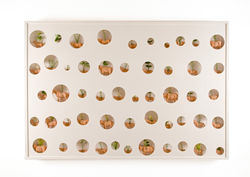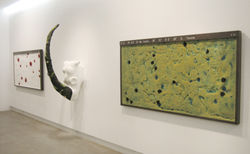NATURALEZA ESPAÑOLA
Manuel Barbero
5 mayo - 3 julio 2011
Calle Alameda 18, Madrid
 |  |  |  |  |  |
|---|---|---|---|---|---|
 |  |  |  |  |  |
 |  |  |  |
MANUEL BARBERO “SPANISH NATURE”
It is a set of paintings and sculptures inspired by a diverse vision of nature. In a recent_cc781905-5cde-3194-bb3b-136bad5cf58 talk, the artist introduced_ this way your last project:
“I remember that in my childhood some of the books on nature referred to an epic vision of the natural world. The titles themselves included adjectives that caught the attention of the young reader as if they were going to immerse themselves in a great adventure novel: wild animals, amazing creatures, unfathomable jungles, dangerous reptiles, beings wonderful, fabulous kingdoms vegetables and minerals. Nature was a magical space, surprising and full of mysteries. La existencia, con mayúsculas, se presentaba como una gran hazaña cotidiana y se describía de forma tan epopéyica_cc781905-5cde-3194-bb3b -136bad5cf58d_ que it was difficult not to get sucked in by its attractive tentacles.”
The artist has wanted for this exhibition to recover that epic presentation of the natural that has so much to do with the artistic (an epic issue too, in these times). “What all those nature books talked about was nothing other than survival, the need to survive and use all possible tools to achieve it. The beauty of nature and its protagonists resides in their ability to choose in an immaculately beautiful way and effectively the most appropriate colors, sizes, shapes and designs to survive.”
Manuel Barbero has wanted to stop looking at the trivial to elevate it to the category of the relevant. The puddles, worms, thistles or non-existent mandrakes in gestation that populate the territories of the invisible are presented in this exhibition as the great protagonists of the adventure of nature. For once the great stars of nature: beautiful prints of the Colorado Canyon, lions devouring zebras or exquisitely colored orchids, give way to what goes unnoticed in the various kingdoms_cc781905-5cde-3194- bb3b-136bad5cf58d_ natural.
“I have believed it necessary to pay more attention to the (apparently) inconsequential because, many times, what we consider substantial is built on it. It is an attention filtered by_cc781905- 5cde-3194-bb3b-136bad5cf58d_ the sense of humor, which I consider to be the best instrument to approach knowledge. In nature we find a great sense of humor and it can be interesting to rely on it to soften the enormous load of drama that seems to surround our existence”.
“The exhibited pieces are a a nod to what is close and, therefore, to identify ourselves with what is close. We have all ever stepped in a puddle or have cataloged an animal whose name and species we did not know as bug. We have referred with contempt to that thistle with which we have pricked ourselves or we have played the alchemy of life watching a pea germinate or the worm become a cocoon. These small experiences so close, so everyday, so inconsequential but at the same time so special, so of a moment in our lives, deserved to be elevated to the category of epic”.
Manuel Barbero has not wanted to renounce poetry either, nor let pass the opportunity to claim it as one of the great weapons to fight against banality. “Although I try to escape from the banal, I recognize that, on some occasions, banality can hide the possibility of reflecting on deeper issues. It is something like when we stare at a can of soda floating in the middle of a puddle and we end up thinking about the importance of genetics for curing diseases. There are times when the necessary is hidden behind the superfluous.”
If thistle, bug or puddle refer us, on the one hand, to a peculiar nature, on the other, they refer us to Spanish. Manuel Barbero uses the term conceiving it as a way of being, of understanding and of being understood. A healthy irony about the ties that unite us as a people both in the natural and in the earthly. There is a great sense of humor concentrated in the Spanish, as there can be in the throwing of olive pipes or in the groups of pipe eaters in a town square.
“If I had to give a recipe for this exhibition it would be the following:
Put into a blender what the father of Jeff Bridges once said to his son, the mini-books on animal kingdoms from 1980, a few drops of Barceló rum, something from Escher, Fontcuberta and Félix, a couple of natural science museums, the collection you may have kept in a closet drawer, a diving license and several dives, the_cc781905-5cde-3194- bb3b-136bad5cf58d_ bestiaries that you have at home, the mosses of the ponds and the crossings through the puddles, the mountains of Biar or some other town that excites you and something else that you can believe of necessity. Mix these serious ingredients well and serve a display similar to this one while hot.”






















